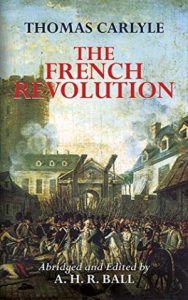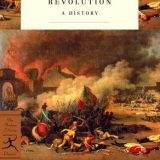The French Revolution – Thomas Carlyle – 1837
Reviewed by: Michael Sympson Date: 6 October 2001
The Argentinian writer Jorge Luis Borges once said that every author creates his own pedigree. In other words I can’t chose my family, but as a writer I do have a choice over who is influencing my outlook and style. (I wonder to whom the author of the Universe was looking up.) However, this is not such a cut and dry thing. After a brief flirt with more baroque modes of expression, Borges developed his characteristically lucid and deceptively simple style that puts the most unusual things in ordinary words. Borges himself pointed to the Norse sagas as his source of inspiration. And almost in the same breath he denounced the mannerisms of Carlyle, which he claimed to have relished in his youth, but now utterly detested.

This might very well be, but cutting off an unwanted uncle from your family doesn’t change the genes in your blood. He still is your kin. Carlyle and Borges have more in common than Borges would like us to think. Both have the same uncanny suggestiveness, the ability to synthesize a variety of perspectives and open wide spaces into a labyrinthine imagination. Borges always liked to refer to Thomas DeQuincey as his spiritual father, and he certainly quotes extensively from DeQuincey, but it might very well be a red herring. One of the many veils between the reader and Al-Mu’tasim. But when I read the introduction to Part II – Book 3 and I knew Borges’s true spiritual ancestor. It must be Carlyle; see for yourself:
“How true that there is nothing dead in this Universe; that what we call dead is only changed, its forces working in inverse order! ‘The leaf that lies rotting in moist winds,’ says one, ‘has still force; else how could it rot?’ Our whole Universe is but an infinite Complex of Forces; thousandfold, from Gravitation up to Thought and Will; man’s Freedom environed with Necessity of Nature: in all which nothing at any moment slumbers, but all is for ever awake and busy. The thing that lies isolated inactive thou shalt nowhere discover; seek every where from the granite mountain, slow-mouldering since Creation, to the passing cloud-vapour, to the living man; to the action, to the spoken word of man. The word that is spoken, as we know, flies-irrevocable: not less, but more, the action that is done. ‘The gods themselves,’ sings Pindar, ‘cannot annihilate the action that is done.’”
“No: this, once done, is done always; cast forth into endless Time; and, long conspicuous or soon hidden, must verily work and grow for ever there, an indestructible new element in the Infinite of Things. Or, indeed, what is this Infinite of Things itself, which men name Universe, but an action, a sum-total of Actions and Activities?” … “This is what man names Existence and Universe; this thousand-tinted Flame-image, at once veil and revelation, reflex such as he, in his poor brain and heart, can paint, of One Unnameable dwelling in inaccessible light! From beyond the Star-galaxies, from before the Beginning of Days, it billows and rolls,–round thee, nay thyself art of it, in this point of Space where thou now standest, in this moment which thy clock measures.”
This doesn’t mean that Borges actually did share any of Carlyle’s opinions, but what they have in common (and what keeps them apart) is more a matter of artistic temperament. Differences of style and rhetorics. Similarities of uniting the diverse and manifold. Because that’s what Carlyle is to us: a rhetorical phenomenon rather than a historian. Should one consult his book for quick orientation on the subject, this is not the place to go. But it helps to expose yourself to the great con-men of that period, to Rousseau and Hegel, and to absorb the essentials of Kant’s philosophy, to better appreciate Carlyle’s references and where he is coming from.
And if you have an opportunity to check out English translations of the German novelist Jean Paul Friedrich Richter – preferably Carlyle’s own – then you have found what influenced the Scotsman most profoundly. I don’t know whether Richter did live to read Carlyle, but there was an undeniable kinship of the temperaments, with the Teutonic twin, surprisingly, of a more liberal make. Richter himself confessed to the lifelong influence of Lawrence Sterne on his work (through translations) an author which Carlyle quite deliberately preferred to ignore, if not treat with disdain. But his own work became a conduit for Richter’s humoristic spirit that inspired Charles Dickens who otherwise didn’t care much about Richter.
In fact this is possibly the most important aspect of Carlyle’s “French Revolution” and partly explains the overwhelming popularity of its reception: for the modern reader it is something like a sample book for Dickens style – without the humor. The great novelist had learned from Carlyle, who in this way became the rejected great-grandfather of the Symbolism in “Bleak House.” And like some of the symbolists, Carlyle at times can teeter precariously close on obscurity for obscurities sake, though he never felt completely comfortable with it. After all, his language was a sort of English, a language unforgiving enough to mark any attempt at obscurity, as the writer’s ineptness – and Carlyle was anything but inept.
In fact he shares with Melville the gift of the word before creation’s first move, although he lacks the American’s feel for rhythm and harmony of vocals. Carlyle was an opinionated sourpuss, his attempts at humor are no success – even his beloved Richter was of no help. If Kipling had been something of an honorably sensible jingoist, then Carlyle must be judged as openly suprematist and a forerunner of modern fascism. In the end his work went against the grain of English and American traditions, and the public rejected him, and not without reason. All things considered, a tremendous read.















